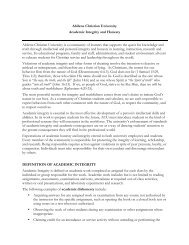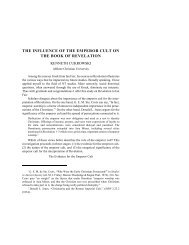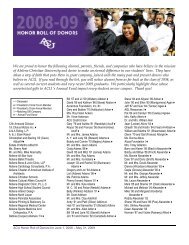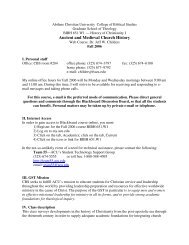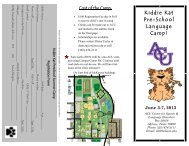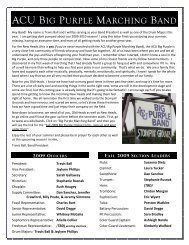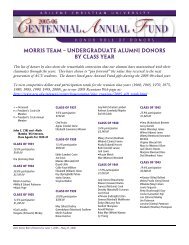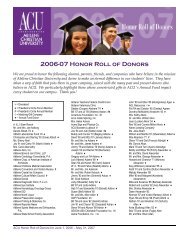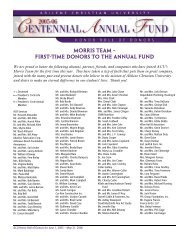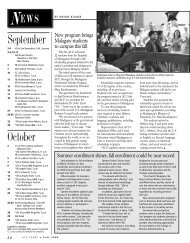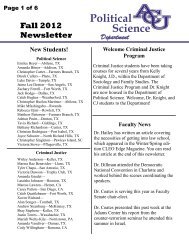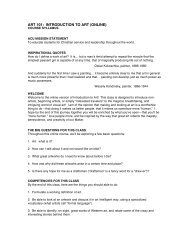pacifism in churches of christ in western canada during world
pacifism in churches of christ in western canada during world
pacifism in churches of christ in western canada during world
You also want an ePaper? Increase the reach of your titles
YUMPU automatically turns print PDFs into web optimized ePapers that Google loves.
230 RESTORATION QUARTERLY<br />
159<br />
<strong>in</strong> the medical corps. Men from the Churches <strong>of</strong> Christ served time <strong>in</strong> all <strong>of</strong><br />
these capacities.<br />
Edw<strong>in</strong> Elford, Henry Grasley, Joe Mann, Walter Hov<strong>in</strong>d, Howard Kemp,<br />
and Bill Forman were granted status as conscientious objectors. They served <strong>in</strong><br />
a work camp <strong>in</strong> Pr<strong>in</strong>ce Albert National Park, Saskatchewan, <strong>in</strong> 1941. Dur<strong>in</strong>g their<br />
time <strong>of</strong> imprisonment, they were not allowed to leave the camp for any reason.<br />
The men worked six days a week and were required to build a road across the<br />
park with the use <strong>of</strong> hand tools only. Sunday was their only day <strong>of</strong>f. In the<br />
afternoon these men walked out <strong>in</strong>to the bush to hold a weekly church service.<br />
They took turns preach<strong>in</strong>g, presid<strong>in</strong>g, and teach<strong>in</strong>g Bible classes. 160<br />
Elford Bell was denied status as a conscientious objector and was assigned<br />
a prison term. While <strong>in</strong> prison, he applied for admission to the medical corps and<br />
was accepted. He served <strong>in</strong> the K<strong>in</strong>gston Military Hospital <strong>in</strong> K<strong>in</strong>gston, Ontario.<br />
He began as a ward orderly, but soon rose to the rank <strong>of</strong> sergeant. By the end <strong>of</strong><br />
his term <strong>of</strong> duty, he was <strong>in</strong> charge <strong>of</strong> the isolation unit, which was attached to the<br />
161<br />
hospital. When the war ended, conscientious objectors were held for an extra<br />
year (until July 1946) because the government feared public outcry if conscien-<br />
162<br />
tious objectors arrived home before the soldiers. Bell applied for a six-month<br />
term <strong>of</strong> duty <strong>in</strong> the Canadian Arctic <strong>in</strong> order to receive an early discharge <strong>in</strong> the<br />
163<br />
spr<strong>in</strong>g <strong>of</strong> 1946. Disagreement existed among members <strong>of</strong> Churches <strong>of</strong> Christ<br />
regard<strong>in</strong>g the enlistment <strong>of</strong> Christians <strong>in</strong> the medical corps. Bell’s family suffered<br />
from the hostility and criticism <strong>of</strong> other Christians because <strong>of</strong> his decision to<br />
enlist <strong>in</strong> non-combatant service. 164<br />
Clarence Bien was imprisoned on two occasions because he refused to report<br />
for tra<strong>in</strong><strong>in</strong>g or apply for a postponement when he was called up. He believed that<br />
apply<strong>in</strong>g for postponement was equivalent to agree<strong>in</strong>g to enlist and go to war at<br />
a later date. Dur<strong>in</strong>g his second term <strong>of</strong> imprisonment, he ga<strong>in</strong>ed release by<br />
appeal<strong>in</strong>g to habeas corpus. As a m<strong>in</strong>ister <strong>of</strong> the Church <strong>of</strong> Christ, he was legally<br />
exempt from military service, therefore wrongfully imprisoned. However, he was<br />
not immediately released. He was held for a couple <strong>of</strong> months <strong>in</strong> the guardhouse<br />
under open arrest. While there, he was assigned hard labor, which consisted <strong>of</strong><br />
clean<strong>in</strong>g the <strong>of</strong>ficers’ washrooms. 165<br />
The legal proceed<strong>in</strong>gs for Bien are significant from two historical perspectives.<br />
First, habeas corpus had not been appealed to s<strong>in</strong>ce World War I. 166<br />
Second, as part <strong>of</strong> the proceed<strong>in</strong>gs, Bien’s defense attorney submitted a descrip-<br />
159 Elford Bell, <strong>in</strong>terview; Clarence Bien, <strong>in</strong>terview; Edw<strong>in</strong> Elford, <strong>in</strong>terview.<br />
160 Edw<strong>in</strong> Elford, <strong>in</strong>terview.<br />
161 Elford Bell, <strong>in</strong>terview.<br />
162 Socknat, 255.<br />
163 Elford Bell, <strong>in</strong>terview.<br />
164 William Bell, <strong>in</strong>terview by author, 2 April 2006, Weyburn, SK, tape record<strong>in</strong>g.<br />
165 Clarence Bien, <strong>in</strong>terview.<br />
166 Clarence Bien, <strong>in</strong>terview.



